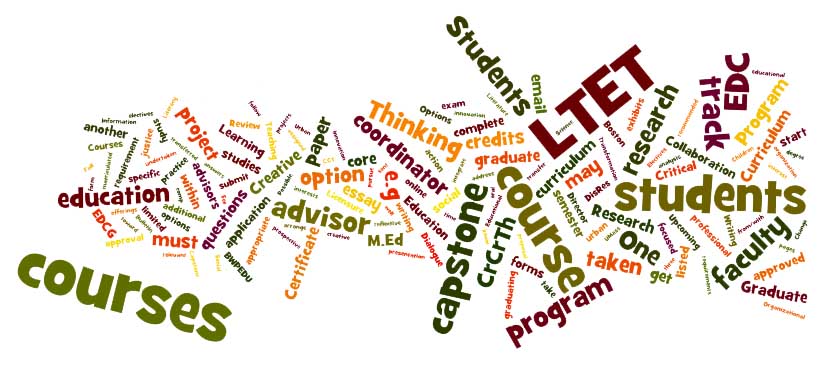LTETCapstone

Learning, Teaching & Educational Transformation
(non-licensure M.Ed. track)
"providing students with knowledge, tools, experience, and support so they can become constructive, reflective agents of change in education within traditional and non-traditional roles and settings, from a social justice perspective and by embedding reflection within their practice"| LTET home, Upcoming Courses, Requirements & Graduation, Joining from/with other tracks, Transfering credits, Capstone Options, Advisors |
Capstone Options
The capstone is completed during the student's last semester or, if final courses are taken in the summer, during the spring semester preceding that. Before the start of the capstone semester, students, after consultation with their advisors, choose between the following two options and inform the LTET track coordinator.1. Comprehensive examination
- This option is a take-home essay examination, sent to you by email attachment. Students are given 30 days (from start of April or November) to complete the assigned questions and return them for evaluation by faculty committee. Students complete this during their final semester in the program. The exam currently consists of three questions, which require short essay answers "addressing significant issues in contemporary education and reflecting the study and research each student has carried out in pursuit of the degree." This rubric (LTETCompRubric.doc) shows how your answers will be evaluated. Evaluations will be emailed to you by the date that grades have to be submitted.
- Remind the program coordinator at the start of your final semester that you are taking the comp and confirm your preferred email address for communication about the comp.
- This option for the capstone project is an opportunity for students to integrate into their professional lives the ideas and theory, skills and strategies, experiences and collaborations from across their studies and associated activities. Students are invited to combine an essay with "exhibits" from their work during the program. The exhibits can take a variety of forms, such as original curriculum materials, a professional development workshop series, a video case study, a practitioner's portfolio, an implemented teacher inquiry project, other excerpts from coursework, or a proposal for action research. The essay is expected to locate the exhibits in relation to what others have written and done in the relevant area as well as to integrate the student's reflections on their own professional practice, changes while studying in the program, and future directions. The forms and length of the essay will depend on the particular nature of the projects. For example, if the exhibit were a 2-4 page action research proposal, an extended essay (20-40 pages) that reviews and critiques literatures appropriate to the research questions would be expected to accompany it; a shorter essay (10-20 pages) would be appropriate to accompany a video case study.
- Students wishing to pursue the option of a written paper with oral presentation for their capstone project are advised to enroll in a course designed for intensive research and writing appropriate to the forms of the project (e.g., EDCG 689, 690, CrCrTh692, 694). The course instructor and an LTET faculty member then serve as readers (i.e., graders) for the project. Note: The paper that fulfills the course requirements should be thought of as an exhibit; as described above, an additional essay, even if quite short, is needed to locate this and any other exhibits. The arrangement for undertaking the capstone project (within a course or outside of it) and the form of the project must be established and approved by the LTET coordinator before the start of the semester in which it is undertaken. Approval will be contingent on a) the proposal showing that the student recognizes the requirements above (as formalized in the rubric for evaluation of these capstones) and b) the student having made good progress on the capstone beyond what the course requires by the time the comp. exam is to be sent out. (Students not making enough progress at that point will be asked to shift to the comp. exam.) Oral presentations before the advisors and peers are arranged toward the end of that semester. (Students who do not complete the requirements or who do not pass by the times grades are due must take the comp. exam the following semester.)
Examples of previous students' written capstones.